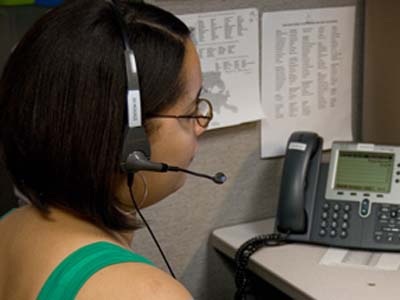Troubled friends have approached Tonya Aubrey all her life in search of a listening ear. Today, she mans crisis phone lines in a quiet room at the back of the Baton Rouge Crisis Intervention Center.The psychology senior and her fellow volunteers for the four phone lines at the center are just a piece of the puzzle in the battle against depression and anxiety among students and the Baton Rouge community.Depression on campus has always been one of the Student Health Center’s concerns, according to Ashley Granger, Wellness Education coordinator. But the center is taking additional measures to identify its presence early on campus this semester because 2008 numbers showed the University is in line with a recent national trend of increased student depression. University percentages are slightly above the national percentages in some areas, according to the spring 2008 National College Health Assessment from the American College Health Association.Seventeen percent of students surveyed nationwide by the ACHA-NCHA reported experiencing depression. Almost 15 percent of those surveyed reported they were diagnosed with depression. In the same spring 2008 survey given at the University, more than 18 percent of those surveyed reported depression, and nearly 14 percent reported being diagnosed. More than 10 percent of students surveyed at the University reported seriously considering suicide in the last school year, and 0.7 percent considered it 11 or more times.Aubrey said she has dealt with callers threatening suicide on the 24-hour volunteer crisis line, The Phone, encountering situations in which a caller has a weapon in hand to end their own life. “You get nervous … You feel like you have people’s lives in your hands,” she said.Suicide was the second-leading cause of death among 25 to 34 year olds and the third-leading cause of death for 15 to 24 year olds, according to a 2008 report from the Centers for Disease Control. An estimated 1,000 students commit suicide on college campuses every year while one in 12 college students have made a suicide plan, according to the National Center for Injury Prevention and Control, a division of the CDC.Sixteen percent of participants in the national survey and 18 percent in the University survey reported stress inhibited their academic performance. Female percentages exceeded males’ in five of the seven depression fields in the University survey. STUDENT HEALTH CENTERIn June 2008, the University joined the National College Depression Partnership — a joint effort of 20 schools nationwide founded by New York University working to identify and eliminate depression among college students. As part of the initiative, the Health Center began implementing depression screening surveys in October 2008 and by March, expanded the scope to every patient seeking treatment at the center.Granger said nearly 280 students are in the Health Center’s registry from the NCDP screenings, which are used to check with students at four weeks, eight weeks and 12 weeks. She said treatment with medication is used as a last resort. Of the 14 percent reporting depression diagnosis in the University’s ACHA-NCHA survey, about 27 percent are currently taking medication.In addition to existing depression and anxiety support groups, social work interns and primary care depression screenings available to students, Granger said screenings will be available online, a new clinician is on hand, and a new grief bereavement group is in the works at the center.She said depression on campus will statistically rise as the scope of the center’s screening expands.”The more law enforcement on your streets, the more the crime rate goes up,” she said. “We are catching students, we are treating their symptoms, and they are getting the care they need.” CENTER FOR ACADEMIC SUCCESSDepression has also sparked a new initiative within the Center for Academic Success, including an intervention “branch” that began operations Monday. Bill Dabney, graduate assistant and social work intern at the center, said the initiative will assess students’ mental health needs in addition to their academic needs using the Beck Depression Inventory — a quick, multiple-choice diagnostic test for depression. The center will be able to perform brief crisis intervention for students, and Dabney said students will be referred to the Health Center if follow-up is necessary.”If no one helps them feel warm about the service, they’re never going to call to make the appointment,” Dabney said.He said about one-third of students who approach him for study issues actually have other problems, such as time management, adjustment, relationship or financial crises and depression symptoms. The most common problem is freshmen and out-of-state students having difficulty adjusting, he said.”If you don’t have immediate success, that can lead an individual to feelings of hopelessness,” Dabney said.THE PHONEAnnemieke Henson, training coordinator at BRCIC, said suicidal callers are assessed for risk according to how likely they are to take their own lives. Lower risks are referred to external support or the Health Center and given follow-up calls. Higher risks require extra steps, and calling EMS is a last resort.Henson said most calls to The Phone are about interpersonal issues, and many students call with personal or stress issues from school work. She also believes depression and anxiety caused by damage from hurricanes Katrina and Gustav linger among students.Audrey has made it through her own financial and family problems, Henson said.”I have a lot of family issues, and I’ve been able to cope with that,” she said. “I came a long way.”Audrey said she is more relaxed now when dealing with crises, even suicide, after her year at BRCIC. She said she started at the center to see if counseling was what she wanted to do. She stayed to show people that if she can make it through bleak times, they can too.”Somebody … in one moment, they’re suicidal. They call The Phone, and they’re not anymore,” Audrey said.Center volunteers are prohibited from giving advice for actions to be taken but rather help callers learn to cope with their problems.Aubrey said crises are defined by the callers — they can be anything. The callers often lack support in their lives and would rather speak to an anonymous stranger, she said. Conversations at BRCIC are totally confidential.Henson said volunteers are always needed. The Phone can be reached at 924-LSU1.————Contact Sarah Lawson at [email protected]
Initiatives help identify, relieve depression
August 25, 2009

Psychology senior Tonya Aubrey answers calls Monday evening on the 24-hour volunteer crisis help line at the Baton Rouge Crisis Intervention Center.





